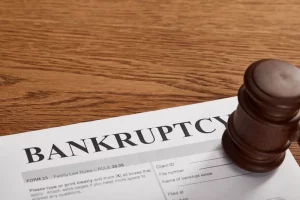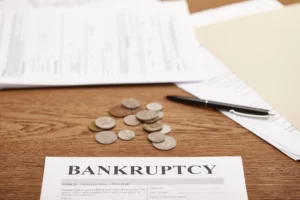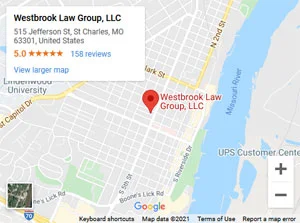Are you thinking of filing for bankruptcy? You’ve read that there are two types: Chapter 7 and Chapter 13. Is one better than the other, and should you go with one or the other? What is the difference between these two types of bankruptcy? Will you qualify for Chapter 7 or 13 bankruptcy? Which documents do you need to file for certain types of bankruptcy? A reliable bankruptcy law firm in St. Charles can answer these questions and more. At Westbrook Law Group, our competent bankruptcy attorneys can help you make the right choice.
Chapter 7 Bankruptcy Overview
Unlike chapter 13, a chapter 7 bankruptcy does not need a repayment plan. Instead, the bankruptcy trustee collects and sells the debtor’s non-exempt assets, using the profits to pay creditors as required by the Bankruptcy Code.
Part of the debtor’s property may be encumbered by liens and mortgages to other creditors. The Bankruptcy Code also enables to retain some “exempt” assets, but a trustee will liquidate the rest. As a consequence, prospective debtors should be aware that filing under chapter 7 may result in property loss.
Chapter 13 Bankruptcy Overview
In Chapter 13 bankruptcy, debtors reorganize their finances under the supervision and consent of the courts. Personal bankruptcy is available to individuals and married couples who are self-employed or run an unincorporated company.
Difficulty repaying creditors within three to five years is part of a Chapter 13 restructuring, sometimes called a wage earner’s plan.
In most cases, the repayment plan must pay creditors a sum comparable to other kinds of bankruptcy, and it may consume all of the debtor’s disposable income if necessary.
Chapter 7 Pros & Cons
Cheapest
Chapter 7 bankruptcy is generally the cheapest to file since the attorney has less work than Chapter 13 or Chapter 11.
Fastest
It takes 3-12 months after filing for a Chapter 7 discharge.
No monthly fee is necessary.
Since there is no surplus income, there is no need to make monthly payments to creditors (as in Chapter 13).
If you have non-exempt assets, you may engage in a voluntary “buy-back” arrangement with your Chapter 7 Trustee to avoid losing them. Buy-back agreements are usually just 12 months long (as opposed to 60 months in a typical Chapter13). It is not because you earn a lot of money, but because you have amassed more property than you are permitted to exempt, and you don’t want to give up your non-exempt assets.
Cons of Chapter 7:
Limiting.
No way to halt a foreclosure. If your house is under foreclosure, Chapter 7 can only temporarily stop the foreclosure process. Eventually, you’ll have to let your house go.
Not guaranteed.
You may desire to file Chapter 7 but are unable to do so because you exceeded the median income.
Chapter 13 Pros & Cons
Stops a foreclosure
Stops a foreclosure if you are facing mortgage foreclosure.
Prevents losing valuables.
If you are concerned about losing valuable assets in a Chapter 7 bankruptcy, then a Chapter 13 bankruptcy may be the answer. You may desire to safeguard rental property that might be lost in a Chapter 7 bankruptcy.
Even if you don’t qualify for Chapter 7 because of your monthly income, you may petition for Chapter 13 to get debt relief.
Cons of Chapter 13
More costly.
Chapter 13 cases need substantially more time and effort from the debtor’s attorney. Therefore, the expense is generally twice or more than a Chapter 7 case.
Time-consuming.
Most Chapter 13 plans last five years, or 60 months, while most Chapter 7 releases occur 3-12 months after filing.
Requires financial restraint.
You must go on a budget. Budget and expenses must be kept low. Every month’s surplus revenue must be paid to creditors.
How to Qualify for Chapter 7 Bankruptcy
Only specified income levels qualify for Chapter 7 bankruptcy. To qualify for the income standards, a filer’s income must be equal to or below the state’s median income.
Every state has its own laws. A debtor who meets a state’s income standards may petition Chapter 7. To determine eligibility for Chapter 7, the debtor must submit to a “means test” if their income exceeds the state median.
Chapter 7 Means Test 101
The means test discourages filers from repaying creditors. On the means test, debt and income from the last six months are assessed. You will fail the means test if you have monthly income left over after paying your creditors.
Even if you are disqualified for Chapter 7, you may file for Chapter 13. In a Chapter 13 bankruptcy, the debtor repays creditors over five years.
Who Can’t File Chapter 7?
You are disqualified for Chapter 7 bankruptcy in the following situations:
- A prior Chapter 7 debt dismissed within the last eight years
- A prior Chapter 13 debt dismissed within the last six years
- Your debts and income would support a Chapter 13 application.
- You tried to cheat creditors or the court.
- You skipped credit counseling.
Chapter 7 Filing
You will be required to undergo credit counseling. After completing credit counseling through a US Trustee-approved service, you may petition for bankruptcy in a local bankruptcy court.
Filing has a cost. Consult the Trustee’s Office for the specific figure. You must submit information on:
- Income
- Debt
- Expenditures
- Creditors’ secured and unsecured debts
- Prior property sale
- Exempt property list
Exempt property is a property that a debtor may retain under Chapter 7. Exempt property varies per state but commonly includes clothes, furniture, and automobiles.
How to Qualify for Chapter 13 Bankruptcy
Not everyone qualifies. You may be prohibited from Chapter 13 bankruptcy if you:
You don’t make enough money.
Chapter 13 debtors must generate enough monthly income to pay off secured commitments like a car or a house. You may be denied this kind of bankruptcy if you don’t earn enough money or your income is unreliable.
You owe an excessive amount of money.
If a debtor’s outstanding obligations are excessive, he or she may be rejected from Chapter 13.
Chapter 13 Filing
Consider meeting with a nonprofit credit counselor and a knowledgeable bankruptcy lawyer in St. Charles. Consulting them will help you understand your situation and determine if bankruptcy is the best option.
In Chapter 13 bankruptcy, you and your lawyer must establish your debt restructuring eligibility to a bankruptcy trustee. You’ll seek court approval for a repayment plan for both unsecured and secured debts. You pay over 3–5 years and keep your assets. Finally, certain debts may be forgiven.
After deciding to file, follow these steps:
- Complete pre-bankruptcy credit counseling: Choose a nonprofit credit counseling service. They may also assist you in creating a repayment plan.
- Hire a bankruptcy lawyer: Incorrectly filling out a form or omitting a step might result in your case being dismissed or some debts not being reimbursed.
- Fill out forms: Your lawyer will assist you to fill out the necessary paperwork. Gather details about your debts, income, property, and monthly costs.
- Submit bankruptcy petition: Submitting the required paperwork sets off the procedure. You will be assigned a bankruptcy trustee when you file and the court will trigger an “automatic stay,” which prevents most debt collectors from contacting you.
- Payment plan submission: Within 14 days of petition filing, you must submit a payment plan. Even if the petition isn’t authorized, you must begin settling payments within 30 days of filing.
- After you submit the petition, the trustee will convene a meeting of creditors.
- Confirmation hearing: 45 days after the creditors’ meeting, you, the trustee, and any creditors who desire to attend confirm the payment plan.
- Payment: Creditors are paid over three to five years.
- Before filing Chapter 13 bankruptcy, you must finish a nonprofit credit counseling agency’s “debtor education course.”
Takeaway: Using chapters 7 or 13, bankruptcy does have consequences. Consulting a lawyer from Westbrook Law Group is highly recommended for this process.
While there are some substantial variations between chapters 7 and 13, the option is ultimately yours. Weigh what you’re comfortable with against what you’ll benefit from more and use the information provided here to help steer your decision. Either way, Westbrook Law Group would love to speak with you more about your financial situation –– schedule a call today to get started.







